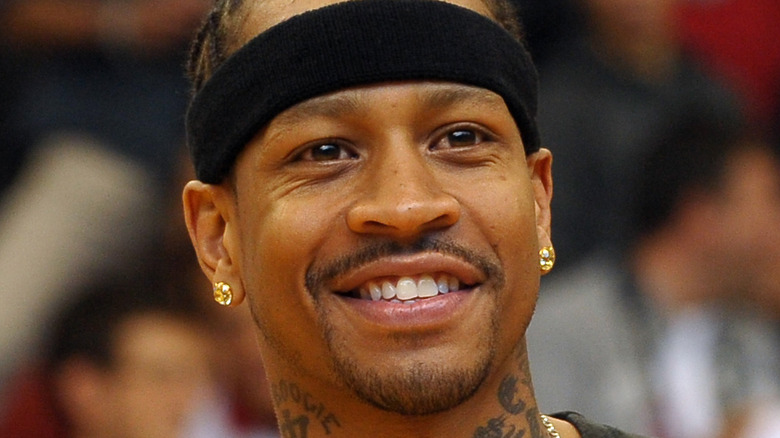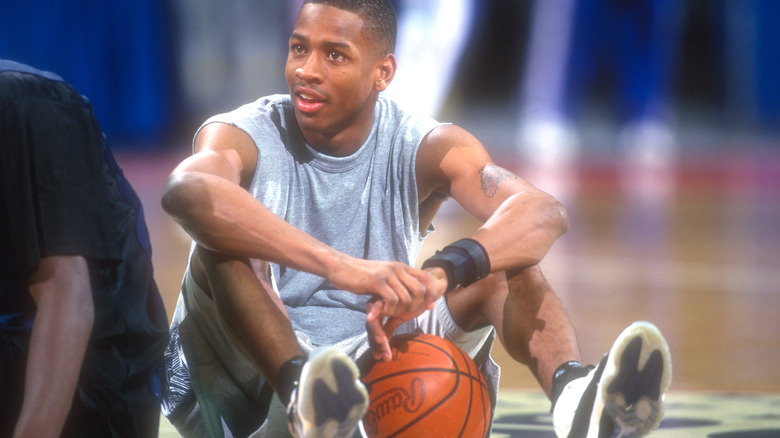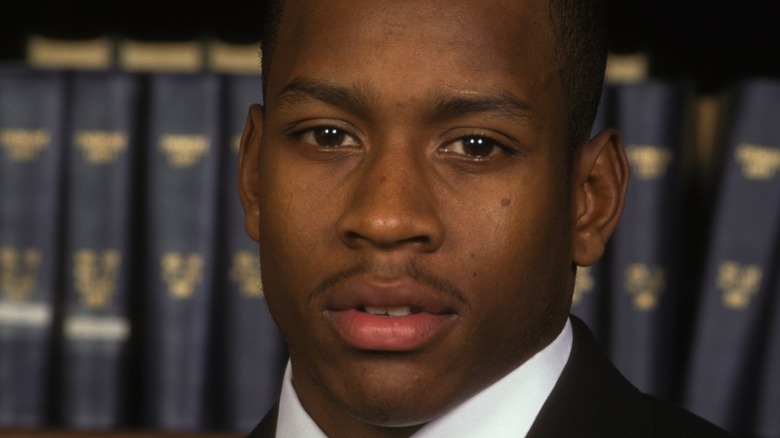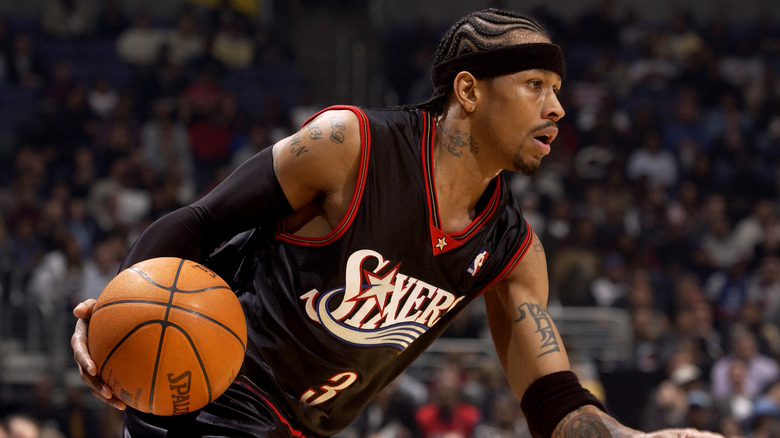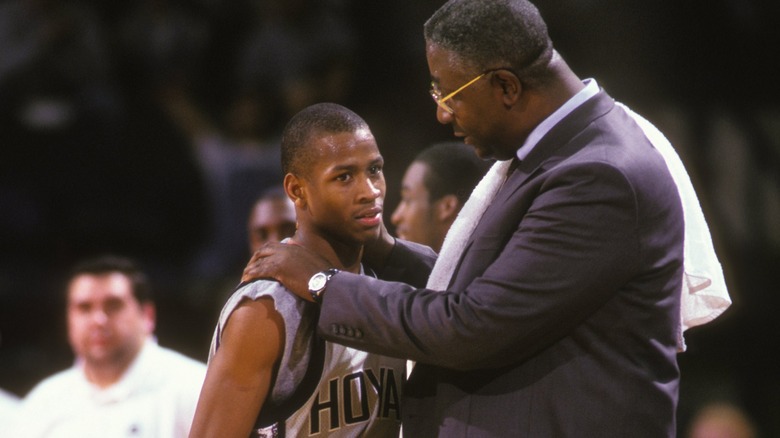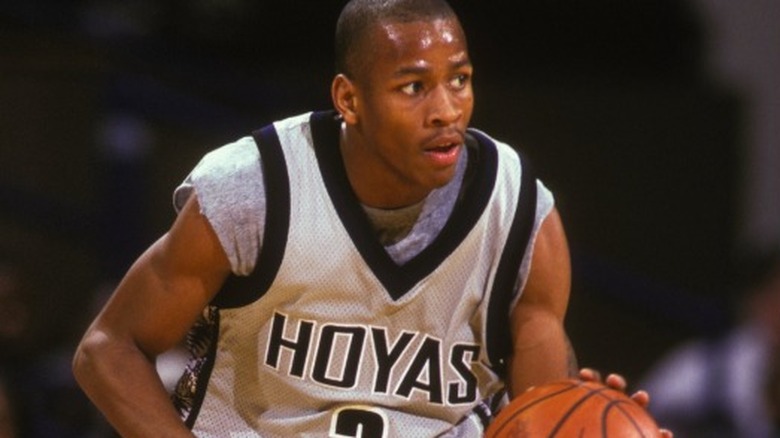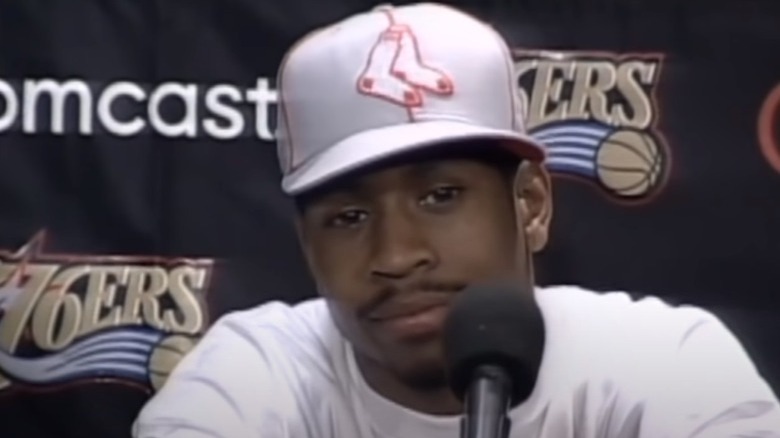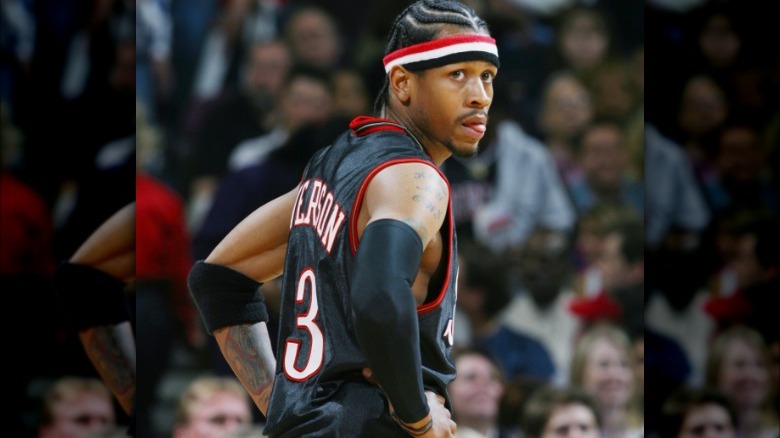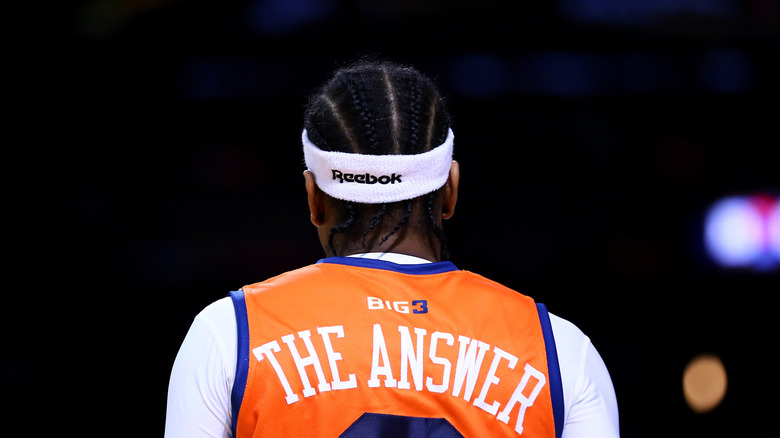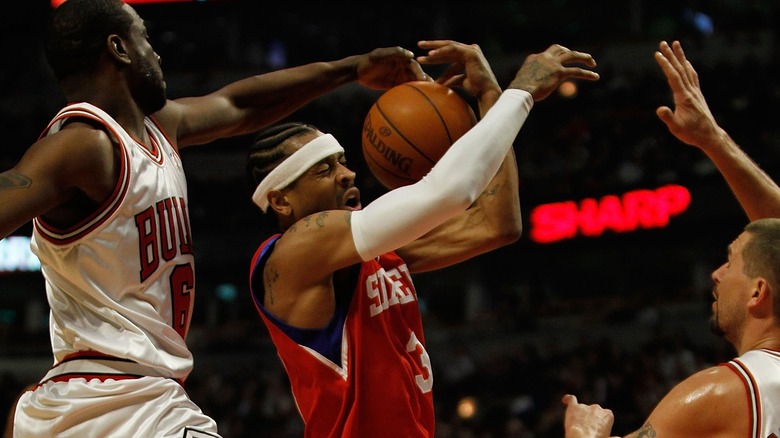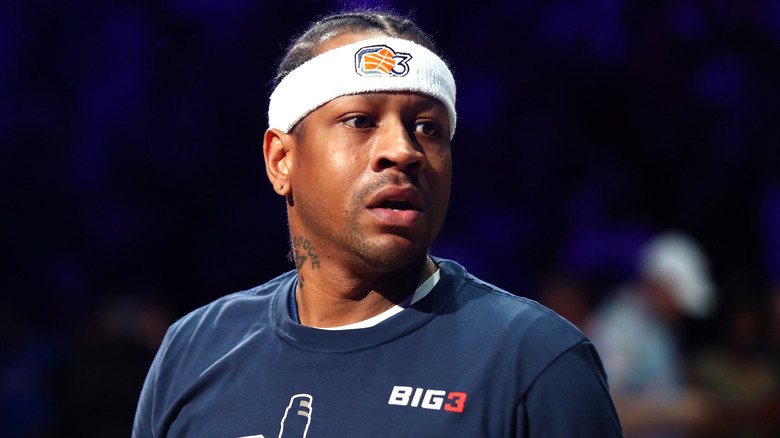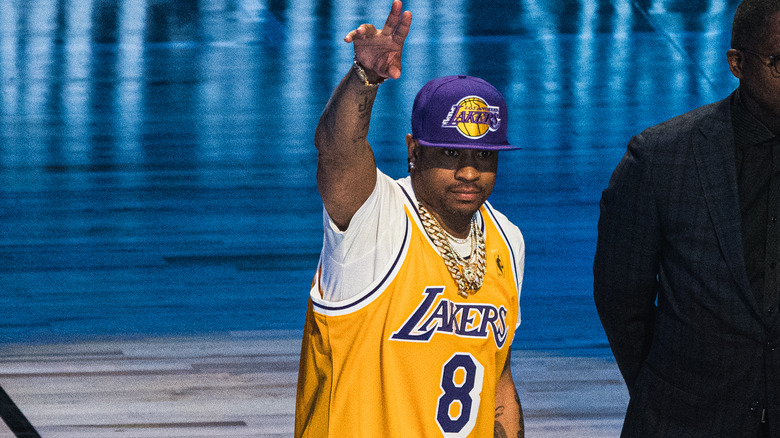The Tragic Real-Life Story Of NBA Legend Allen Iverson
Some people play professional sports, and others change them. The latter is the case with Allen Iverson, who's widely credited with reshaping and updating basketball into something modern and appealing to a whole new generation of fans. He was the guy that could get the crowd on their feet, the one who didn't check his personality at the door, and who was 100% all in, all the time.
When Iverson announced his retirement in 2013 (via ESPN), he was candid about his career — saying he would always consider himself a 76er, first and foremost — and the toll that public scrutiny had taken on him. While he was known for being unconditionally and boisterously himself, the comments and rumors that circulated — from his divorce to rumors of financial difficulty — were getting to him. "It does bother me, I have a heart just like everybody else. People have encouraged me to address those issues. But if I know and my family knows and people that are close to me know, why do I have to explain myself?"
And it's true: Iverson has done a shocking amount of explaining over the years, and he's had a lot to explain. His road to and through the NBA has been one filled with tragedy and heartbreak, but at the same time, he remains an inspiration to the strength of the human spirit. Iverson has overcome and endured, and his is a powerful tale. Here is the tragic real-life story of NBA legend Allen Iverson.
His childhood was unimaginably hard
Born in Virginia in 1975, Allen Iverson's mother was 15 years old and unmarried — according to ESPN, he would have little to do with his father. His mother was hard-working and tenacious: She, says The Washington Post, was the one who ultimately reached out to Georgetown coach John Thompson to ask him — face-to-face — to give her son the chance to play college ball.
He'd been doing it for a long time, and not just in school — he played on the city streets for cash, and when he won, it meant that he could put dinner on the table. His high school coach, Mike Bailey, recalled, "There were times when Allen never knew where his next meal was going to be. Here's a kid who couldn't take a bath because he had no running water because it had been turned off."
There's perhaps no anecdote that better sums up Iverson's childhood than his description of their home. While Ann and Allen both worked, struggled, and hustled, coming home to their house in the projects was, at times, unbearable. When David Falk agreed to act as the young basketball star's agent, he learned that part of his desire to get into the NBA was to get himself and his mother out of their living situation. "There was a sewage problem in her house," Falk recalled. "Sewage was seeping through the floor and Allen said there was a stench that was just unimaginable."
His involvement in a fight nearly ruined his life
Allen Iverson's hometown is Hampton, Virginia — and according to NPR, he very nearly didn't make it out. At the same time he was heralded as a high school sports star leading his teams to victories, Iverson learned early on that racism was stronger than school spirit. He was 18 years old when he was involved in a fight at a bowling alley, and there were two very different stories told when the dust settled. Iverson and his friends said they had been targeted with a racial slur, while the other party claimed they had simply been attacked.
Witnesses who testified in the following trial backed up Iverson's story, a fact that was noted by The Washington Post when they reported on the eventual overturning of Iverson's sentence. At the time of that verdict, he had been in prison for four months — and the law he had been convicted under was nothing short of shocking.
Virginia laws included a post-Civil War statute called "maiming by mob," and according to Steve James — the director of a biography featuring Iverson's story — it was originally written to ensure mob violence — that tended to end in the injury and death of Black Virginians — was punishable to an appropriate extent. It was that law that led to Iverson's sentence of 15 years: In 1995, it was determined that there was no proof of any of the claims that had led to the stiff sentence.
His mentor had struggles of his own
In 1998, Sports Illustrated did a profile on the up-and-coming Allen Iverson, noting that although he had clearly been built for basketball and was destined for great things, he was regularly ridiculed from the stands and yes, it absolutely bothered him: "I got [corn]rows, but that don't mean I'm no gangbanger. I ain't never been in a gang. Why people wanna judge me like that?" he was quoted as saying.
It was also pointed out that at the same time, Iverson was associated with people who were on the wrong side of the law, specifically, his stepfather, mentor, and the man who taught him to play basketball, Michael Freeman. Freeman had entered Iverson's life when he was little more than a baby, and although he had helped support the family through his job at the local shipyards, a car accident and subsequent lay-off meant that with few options, he turned to the drug trade. Throughout the 1990s, he accumulated a slew of drug charges: At the time Iverson entered Georgetown, Freeman had just gotten out of prison on parole (via The Washington Post), and in 2007, the media was reporting on yet another drug charge, according to the Daily Press (via ESPN).
Iverson has remained steadfastly by his side, once saying, "He was just trying to feed his family. I would kill him to come home from jail and find out how his family was living. One time, he came home and just sat down and cried."
Almost all of his opportunities were taken away
Allen Iverson might have made history as one of the best players the NBA ever saw, but he almost didn't get the chance. When he was inducted into the Naismith Memorial Basketball Hall of Fame in 2016, he thanked one man in particular for his entire career (via USA Today): Georgetown coach John Thompson.
He said: "I want to thank coach Thompson for saving my life. For giving me the opportunity. I was recruited by every school in the country for football and basketball. And an incident happened in high school and all that was taken away. ... My mom went to Georgetown and begged him to give me a chance. And he did."
He wasn't exaggerating, either. Before his conviction in the bowling alley brawl, Iverson had been courted by big names like Duke. Hoya Basketball says that he had around three dozen separate offers, all from top-tier schools, until suddenly, no one wanted to take a gamble on him. Even though the ruling was overturned and there was video evidence that proved his innocence, it took his mother's trip to appeal directly to coach Thompson to get anyone to give him a chance. When they did, not everyone was on board — but when he took the court, the national media immediately predicted he was going to be the next big star.
His decision to turn pro was partially to help pay his sister's medical bills
Iverson's career at Georgetown would end up being pretty short. He was a sophomore in 1996, and that's when he and coach John Thompson held a press conference saying that he was going to be going professional at a shockingly young age.
At the time, the Associated Press reported that Thompson had expressed some concern: While he had no doubts that Iverson could keep up with the NBA's best, he made it clear that he wasn't sure Iverson was mature enough to handle the lifestyle that he was going to be walking into. That, however, came with a "but."
The reason for Iverson's decision to go pro early was a financial one, and he shared at the press conference that he had a little sister at home who desperately needed medical help. Little Iiesha was just a toddler and prone to seizures, and his NBA paycheck was going to get her the medical attention that she needed. And that, Thompson said, suggested to him that Iverson was making the right choice. Still, the incident led to Thompson's honest lambasting of NCAA rules that didn't allow colleges and teams to help the families of players in need.
The story behind his practice rant
Being in the public eye can be brutal, and in 2002, Allen Iverson sat in front of a media spotlight that pulled his strings ... and he unraveled. The incident needs no recap: It was one of the most infamous press conferences in sports history. It was so volatile that Iverson was accused of being drunk during the conference, an accusation that he's repeatedly denied (via ESPN's "First Take").
There was, in fact, something wrong with Iverson, but it wasn't what often got repeated: He was grieving the death of a close friend. Rahsaan Langford wasn't just a friend, he was such a good friend of Iverson's that he'd been a groomsman at his wedding. The Daily Press reported that the married, father-of-three had been shot and killed several months prior to the news conference, but the emotional wound was still open and fresh: The trial of the man accused of pulling the trigger had just begun.
After Iverson's oft-repeated comments about practice, there are sound bites that don't get as much air time. Iverson explained his anger (via ESPN): "I'm upset for some reason: 'Cause I'm here. I lost. I lost my best friend. I lost him, and I lost this year. Everything is just going downhill for me, as far as just that. You know, as far as my life. ... My best friend is dead. Dead." Gregory Fox was later convicted of the killing, and in 2014, he released a book claiming he had killed in self-defense.
The nylon sleeve wasn't just for style
In 2015, The Wall Street Journal questioned the necessity of a trend they'd noticed — and, they noted, it was a trend that had been started by Allen Iverson. That was the wearing of compression sleeves, and they'd noticed something interesting. A full 65% of players wore at least one sleeve, while 3% wore four. That led to questions about whether it was out of necessity or fashion, and when they started asking players, many responded that they didn't actually need it.
For Iverson, though, it wasn't a fashion statement — he'd started wearing compression sleeves on his shooting arm to relieve the pain of a condition called bursitis. What is that? It's an incredibly painful condition that can develop in a person's joints — especially when those joints are subjected to repeat motion — and it's caused by inflammation. Rest is the typical treatment, but that's not really an option for a professional basketball player.
According to The New Yorker, Iverson first wore the stocking because he was in a lot of pain — and he was hoping to avoid having surgery to fix the problem. Iverson's compression stocking was eventually replaced by custom sleeves from Under Armour, which kicked off the fashion statement. Still, it wasn't successful as far as avoiding surgery went: He had surgery on his elbow that same year, and to add insult to injury, he was sidelined with a broken finger not long after his return.
He was sued over his nickname
Urban legends spring up around many sports stars, and Allen Iverson was no exception. Even more so, the Los Angeles Times says that it's not precisely a legend: It's 100% true. And that's the claim that he was once taken to court over his famous nickname, "The Answer."
The origins of the lawsuit went back to when Iverson was still in school. He and his struggling family were occasionally helped along by a family friend named Jamil Blackmon, and at this point, Iverson was already a star athlete. Blackmon came up with the idea of nicknaming Iverson "The Answer," and would later say that Iverson had agreed to pay him 25% of all revenue that the nickname generated. Given that this revenue would go on to include a deal with Reebok and shoes sporting Iverson's nickname, it's safe to say that amounted to a pretty penny.
Blackmon, however, never got the money and ended up taking Iverson to court over it. It was ultimately ruled that there was no case — mostly because without Iverson's skill and athleticism, the nickname didn't mean much at all. Add in the ruling that there was never really a contract there in the first place, and Blackmon walked away with nothing.
Referees specifically targeted him with unfair calls
Every sports fan has been convinced at least once that the refs have it out for their team. According to one whistle-blowing ex-NBA ref, that's true, and Allen Iverson was specifically targeted with unfair calls.
That ref was Tim Donaghy, who was convicted of wire fraud and conspiracy after admitting that he had been betting on the games he was participating in. After serving his sentence, he later appeared on "60 Minutes" to say (via CBC) that part of the reason he had been so successful at placing bets was that if Iverson was in the game, he knew how the calls were going to go based on what refs were in the game.
The claims laid out in the show (via The Denver Post) were pretty heavy stuff. Donaghy claimed — for example — that after Iverson had gotten into a screaming match with a ref and was handed a fine instead of a suspension, refs started calling him for penalties that were rarely enforced. He was even able to name a specific instance — a game on January 7, 2000 — that he was involved in calling. He and the other refs, he said, "sought out to do a little justice of our own. In the pregame meetings, we came to the conclusion that we were not gonna give Allen Iverson any marginal plays for the basket." Review of the game footage revealed that fouls against Iverson were not called, while he was penalized for nine. The NBA denies Donaghy's accusations.
His daughter was diagnosed with a severe illness
Love him or hate him on the court, it doesn't matter — no one should wish harm on the family of an athlete, especially when it comes to their children. In 2010, the Associated Press (via ESPN) reported on some shocking news: Allen Iverson was walking away from the game, and there was no sign of when he was going to be back. He was already saying that he was going to be missing at least eight games total, but he had a very, very good reason for it — his 4-year-old daughter was sick, and he wanted to be with her.
Initially, it was reported that he had intended to return to the court after spending some time with his family. He cited a commitment to his team as his reason for leaving his wife and children behind as doctors struggled to figure out what was wrong. "In my heart, I wanted to be there," he explained. "I wanted my daughter and my kids to see me be there. ... I just think the bigger responsibility was to be with my daughter at the time."
Iverson didn't get into details about what she had been suffering from, but photographs of his daughter posted to Instagram suggest that, in the end, everything turned out alright.
He's said he's been targeted by get-rich lawsuits
According to Allen Iverson, he's been targeted by some lawsuits filed by people hoping to get a payout. That, reported the Associated Press (via ESPN), was what he had to say about a 2007 lawsuit that went back to an alleged nightclub brawl in 2005. Iverson claimed that he had seen things starting to go sideways and left, but a judge ultimately disagreed and awarded the plaintiff a hefty $260,000.
Then, in 2009, another lawsuit filed against Iverson claiming he was responsible for another bar fight was dismissed for lack of evidence, reported the Associated Press (via The New York Times), and in 2017, yet another lawsuit was filed by a man claiming an altercation with Iverson's bodyguard had left him with broken ribs.
In 2007, Iverson was quoted as saying, "I think I'm here because I worked hard all my life to get where I'm at, and they want to get rich overnight." And that, in fact, was what the Associated Press was reporting on way back in 2002. According to an eyewitness, police detectives had been seen drinking to his next felony just before he was brought up on charges of threatening with a deadly weapon. (They were ultimately dropped.) Iverson said of the witness's claims, "It scares me. I know that if there's a crooked cop out there, they could do anything to me. ... Allen Iverson could wind up dead tomorrow if a crooked cop wants him dead."
